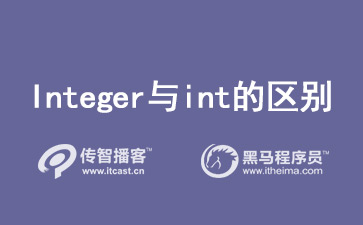更新时间:2020-10-29 来源:黑马程序员 浏览量:
1、Integer是int的包装类,int则是java的一种基本数据类型 ;
2、Integer变量必须实例化后才能使用,而int变量不需要 ;
3、Integer实际是对象的引用,当new一个Integer时,实际上是生成一个指针指向此对象;而int则是直接存储数据值;
4、Integer的默认值是null,int的默认值是0;

问题一:
public static void main(String[] args) {
Integer a = 100;
Integer b = 100;
System.out.println(a == b);
Integer c = 200;
Integer d = 200;
System.out.println(c == d);
}
请问:a==b的值以及c==d的值分别是多少?
答案: a==b为true; c==d为false
原因分析:
Integer a = 100;实际上会被翻译为: Integer a = ValueOf(100);
从缓存中取出值为100的Integer对象;同时第二行代码:Integer b = 100; 也是从常量池中取出相同的缓存对象,因此a跟b是相等的;而c 和 d
因为赋的值为200,已经超过 IntegerCache.high
会直接创建新的Integer对象,因此两个对象相⽐较肯定不相等,两者在内存中的地址不同。
问题二:
Integer a = 100; int b = 100; System.out.println(a == b);
Integer a = new Integer(100); int b = 100; System.out.println(a == b);
输出结果是什么?
答案为:ture,因为a会进行自动动拆箱取出对应的int值进行比较,因此相等。
问题三:
Integer a = new Integer(100); Integer b = new Integer(100); System.out.println(a == b);
输出结果是什么?
答案为:false,因为两个对象相比较,比较的是内存地址,因此肯定不相等。
问题四:
最后再来一道发散性问题,大家可以思考下输出的结果为多少:
public static void main(String[] args) throws NoSuchFieldException,
IllegalAccessException {
Class cache = Integer.class.getDeclaredClasses()[0];
Field myCache = cache.getDeclaredField("cache");
myCache.setAccessible(true);
Integer[] newCache = (Integer[]) myCache.get(cache);
newCache[132] = newCache[133];
int a = 2;
int b = a + a;
System.out.printf("%d + %d = %d", a, a, b);
}
答案为: 2 + 2 = 5. 大家可以下来好好思考下为什么会得到这个答案?

猜你喜欢: